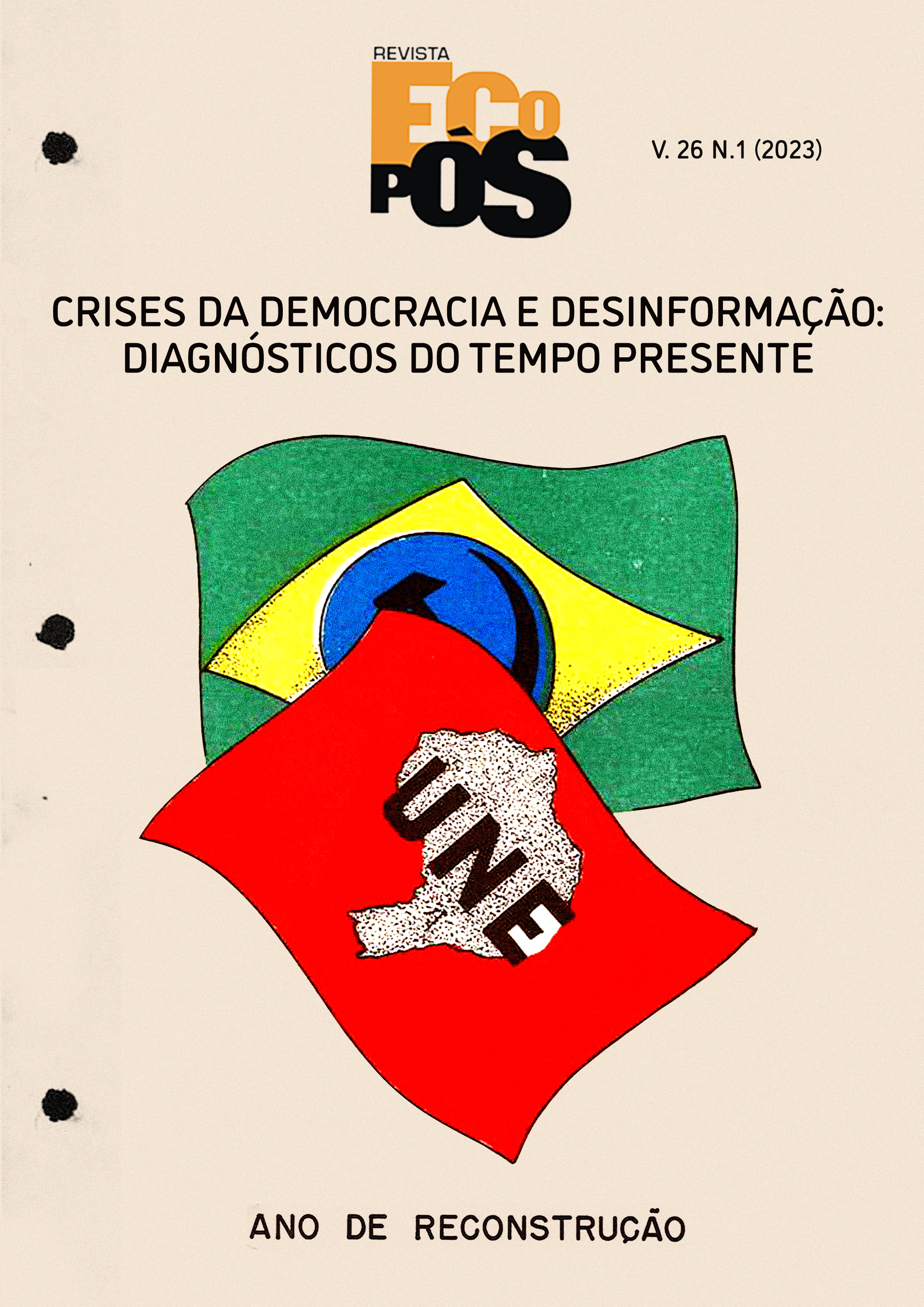Esports and reflexivity
ethnographic notes of an apprentice pro-player
DOI:
https://doi.org/10.29146/eco-ps.v26i01.27935Keywords:
Game studies, ethnography, communication, esports, reflexivity, pro-playersAbstract
This article revisits an ethnography of a community of semi-professional gamers for whom (auto)biography, participation, and the researcher's camera have become not only a research approach, but a useful resource for team promotion. The study explores the central role played by (auto)biography, participation, and affect in ethnographic research in digital games and esports. It concludes by considering some of the intersections between social markers and professional culture in video games – including the implications of these aspects for social scientific data collection – how ethnographic participation contributes to problematizing scenarios and fostering other encounters and questioning in an environment with its own access codes, idiosyncrasies, understandings, challenges, and possibilities.
Downloads
References
AARSETH, Espen. Playing Research: Methodological approaches to game analysis. In: The Digital Arts and Culture Conference, 2003.
APPERLEY, Thomaz & JAYEMANE, Darshana. Game Studies’ Material Turn. Westminister Papers in Communication and Culture, London, v. 9, n. 1, p. 5-25, 2012.
BOELLSTORFF, Tom; NARDI, Bonnie; PEARCE, Celia; TAYLOR, T. Ethnography and Virtual Worlds: A Handbook of Method. Princeton: Princeton University Press, 2012.
BROWN, Ashley. Awkward: The importance of reflexivity in ethnographic methods. In: LANKOSKI, Petri; BJÖRK, Staffan (Ed.). Game Research Methods: An Overview. Pittsburgh: ETC Press, p. 77-92, 2015.
CAIAFA, Janice. Sobre a etnografia e sua relevância no campo da comunicação. Questões Transversais, São Leopoldo, v. 7, n. 14, p. 1-164, 2019.
COPIER, Marinka. Beyond the Magic Circle. A Network Perspective on Role-Play
in Online Games. 2007. Tese – Universiteit Utrecht. Utrecht, Holanda, 2007.
EWING, Katherine. Dreams from a Saint: Anthropological Atheism and the Temptation to Believe. American Anthropologist, Arlington, v. 96, n. 3, p. 571-583, 1994.
FABIAN, Johannes. Out of our minds: reason and madness in the exploration of Central Africa. Berkeley: University of California Press, 2000.
FABIAN, Johannes. Anthropology with an Attitude: Critical Essays. Stanford: Stanford University Press, 2001.
FALCÃO, Thiago. Não-humanos em Jogo. Agência e Prescrição em World of Warcraft. 2014. Tese – Universidade Federal da Bahia, Salvador, 2014.
FALCÃO, Thiago; MACEDO, Tarcízio; KURTZ, Gabriela. Conservadorismo e masculinidade tóxica na cultura gamer: Uma aproximação a Magic: The Gathering. MATRIZes, São Paulo, v. 15, n. 2, p. 251-277, 2021.
FALCÃO, Thiago; MARQUES, Daniel; MUSSA, Ivan; MACEDO, Tarcízio. At the Edge of Utopia. Esports, Neoliberalism and the Gamer Culture’s Descent into Madness. Journal Gamevironments, Bremen, v. 13, n. 2, p. 382-419, 2020.
FAVRET-SAADA, Jeanne. “Ser afetado”, de Jeanne Favret-Saada. Revista Cadernos de Campo, São Paulo, v. 13, n. 13, p. 155-161, 2005.
FRAGOSO, Suely. Mediações espaciais da sociabilidade on-line. In: OLIVEIRA, Ivone & MARCHIORI, Marlene (org.). Redes Sociais, Comunicação, Organizações. São Caetano do Sul: Difusão, 2012, v. 1, p. 67-84.
GOLDMAN, Marcio. Os tambores do antropólogo: Antropologia pós-social e etnografia. Ponto Urbe, São Paulo, v. 2, n. 3, 2008.
GOULET, Jean-Guy. Trois manières d’être sur le terrain: une brève histoire des conceptions de l’intersubjectivité. Anthropologie et Sociétés, Quebec, v. 35, n. 3, p. 107-125, 2011.
KLASTRUP, Lisbeth. Towards a Poetics of Virtual Worlds: Multi-User Textuality and the Emergence of Story. 2003. Thesis – IT University of Copenhagen, Copenhagen, 2003.
LATOUR, Bruno. Where are the Missing Masses? The Sociology of a Few Mundane Artifacts. In: BIJKER, Wiebe & LAW, John (Eds.). Shaping Technology/Building Society: Studies in Sociotechnical Change. Cambridge: MIT Press, p. 225-258, 1992.
MACEDO, Tarcízio. Like a Pro: Dinâmicas Sociais no e-sport. 2018. Dissertação – Universidade Federal do Pará, Belém, 2018.
MACEDO, Tarcízio & FALCÃO, Thiago. E-Sports, herdeiros de uma tradição. Intexto, Porto Alegre, v. 45, n. 2, p. 246-267, 2019.
MACEDO, Tarcízio & KURTZ, Gabriela. Quem não sonhou em ser um jogador de videogame? Colonialidade, precariedade e trabalho de esperança em Free Fire. Contracampo, Niterói, v. 40, n. 3, p. 1-23, 2021.
MARRANCI, Gabriele. The Anthropology of Islam. Oxford: Berg Publishers, 2008.
MARTINO, Luís & MARQUES, Ângela. Afetividade do conhecimento na epistemologia: a subjetividade das escolhas na pesquisa em Comunicação. MATRIZes, São Paulo, v. 12, n. 2, p. 217-234, 2018.
PEIRANO, Mariza. Etnografia não é método. Horizontes Antropológicos, Porto Alegre, v. 20, n. 42, p. 377-391, 2014.
SÜNDEN, Jenny. Play as transgression: an ethnographic approach to queer game cultures. In: PROCEEDINGS OF DiGRA. London: Brunel University, 2009, 1-7.
TAYLOR, Nicholas. Professional Gaming. In: MANSELL, Robin & ANG, Peng (Ed.). The International Encyclopedia of Digital Communication and Society. London: Wiley Blackwell, p. 987-990, 2015.
TAYLOR, Nicholas. Play to the camera: Video ethnography, spectatorship, and e-sports. Convergence, London, v. 22, n. 2, p. 115-130, 2016.
TAYLOR, T. Play Between Worlds: Exploring Online Game Culture. Cambridge: MIT Press, 2006.
TAYLOR, T. Raising the Stakes: E-Sports and the Professionalization of Computer Gaming. Cambridge: MIT Press, 2012.
TRAVANCAS, Isabel. A experiência etnográfica no campo da comunicação. In: DUARTE, Jorge; BARROS, António (Org.). Métodos e técnicas de pesquisa em comunicação. São Paulo: Atlas, p. 98-109, 2005.
Downloads
Published
How to Cite
Issue
Section
License
Copyright (c) 2023 Tarcízio Macedo, Manuela do Corral Vieira

This work is licensed under a Creative Commons Attribution-NonCommercial-NoDerivatives 4.0 International License.
Aos autores pertence o direito exclusivo de utilização ou reprodução.
Você tem o direito de:
- Compartilhar — copie e redistribua o material em qualquer meio ou formato.
- Adaptar — remixar, transformar e construir sobre o material para qualquer filme, mesmo comercial.
O licenciante não pode revogar esses direitos, desde que você respeite os termos da licença.
De acordo com os seguintes termos:
- Atribuição — Você deve dar o devido crédito, fornecer um link para a licença e indicar se essas alterações foram feitas. Você pode fazê-lo de qualquer maneira razoável, mas não de maneira que sugira que o licenciante endosse ou aprove seu uso.
- Sem restrições adicionais — Você não pode aplicar termos legais ou medidas de natureza tecnológica que restrinjam legalmente outros de fazer algo que a licença permite.
Aviso: A licença pode não fornecer todas as permissões necessárias para o uso pretendido. Por exemplo, outros direitos, como publicidade, privacidade ou direitos morais, podem limitar a maneira como você usa o material.











